Ever heard someone say, “Your offer is contingent on approval” and wondered what that means? 🤔
The word “contingent” pops up in job offers, real estate deals, and even insurance or legal documents — but it’s not as complicated as it sounds.
In simple terms, “contingent” means something that depends on certain conditions being met.
If it’s a contingent job offer or a contingent sale, the idea is the same — things will only move forward if something else happens first.
In this article, we’ll break down its exact meaning, origin, real-life examples, and how to use it correctly — so you’ll never get confused by this smart-sounding word again. 💡
📘 Definition & Meaning
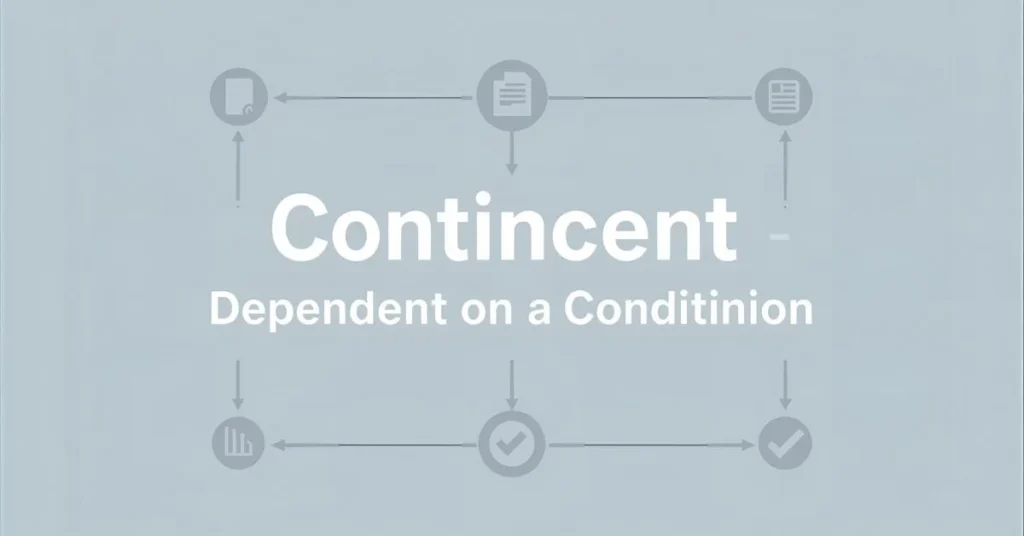
The term “contingent” means dependent on specific conditions or circumstances. It describes something that’s not guaranteed but will occur if certain requirements are met.
Example (Conversation):
A: “Did you get the job?”
B: “Yes, but it’s contingent on my background check.”
Here, the job offer isn’t final yet — it depends on the result of the background check.
💬 Quick Definition Table
| Term | Meaning | Example |
|---|---|---|
| Contingent | Conditional or dependent | “The sale is contingent on inspection results.” |
| Contingency | The condition or event itself | “We planned for every contingency.” |
🕰️ Background & History
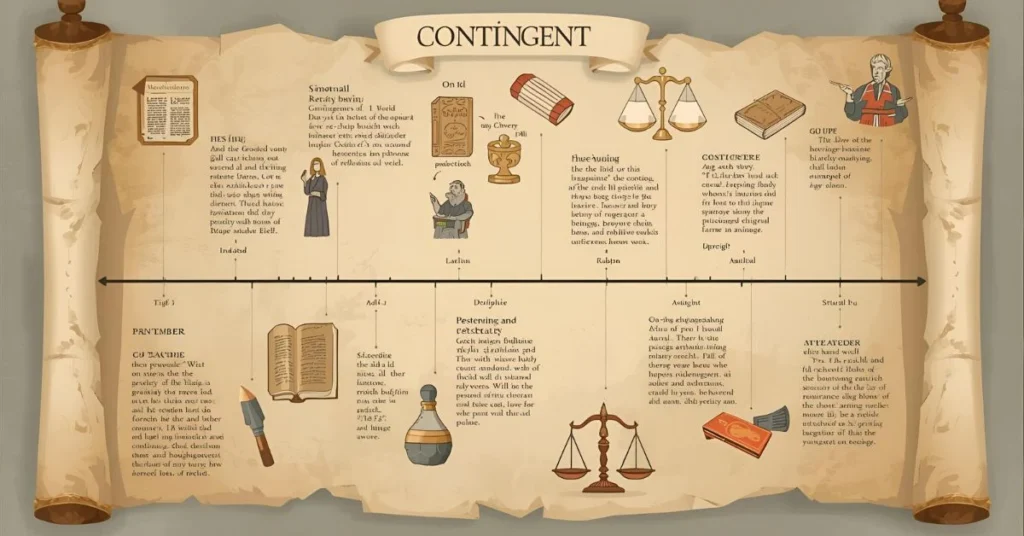
The word “contingent” comes from the Latin contingere, meaning “to happen” or “to touch.” It evolved through Old French into English, keeping its idea of something that may or may not happen depending on other factors.
Historically, it was used in law and philosophy to contrast with things that were “necessary” or “certain.” Today, it’s widely used in:
- Contracts (e.g., contingent clauses)
- Business deals (e.g., contingent payments)
- Everyday talk (“It’s contingent on the weather”)
Its meaning has stayed surprisingly consistent — always tied to uncertainty and conditional outcomes.
💼 Usage in Various Contexts

Let’s explore how “contingent” is used across fields 👇
📋 1. In Job Offers
“Your employment is contingent upon completing orientation.”
➡️ The job is only finalized once the orientation requirement is met.
🏠 2. In Real Estate
“This offer is contingent on the buyer securing a loan.”
➡️ The sale happens only if the buyer gets financing.
⚖️ 3. In Legal Contracts
“Payment is contingent upon delivery.”
➡️ The money is paid after the delivery condition is fulfilled.
💬 4. In Everyday Speech
“Our picnic is contingent on the weather.”
➡️ You’ll only go if it doesn’t rain!
🚫 Common Misconceptions & Clarifications
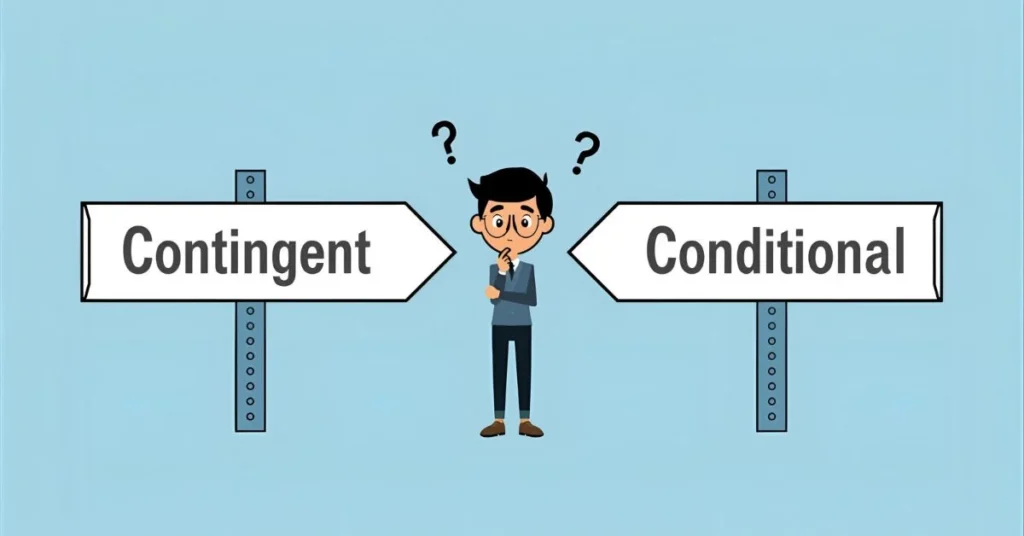
Many people confuse “contingent” with:
- Guaranteed — but it’s the opposite!
- Temporary — not always true. It can describe any conditional situation.
Example:
❌ “Contingent means something short-term.”
✅ “Contingent means something that depends on a condition.”
🔁 Similar Terms & Alternatives
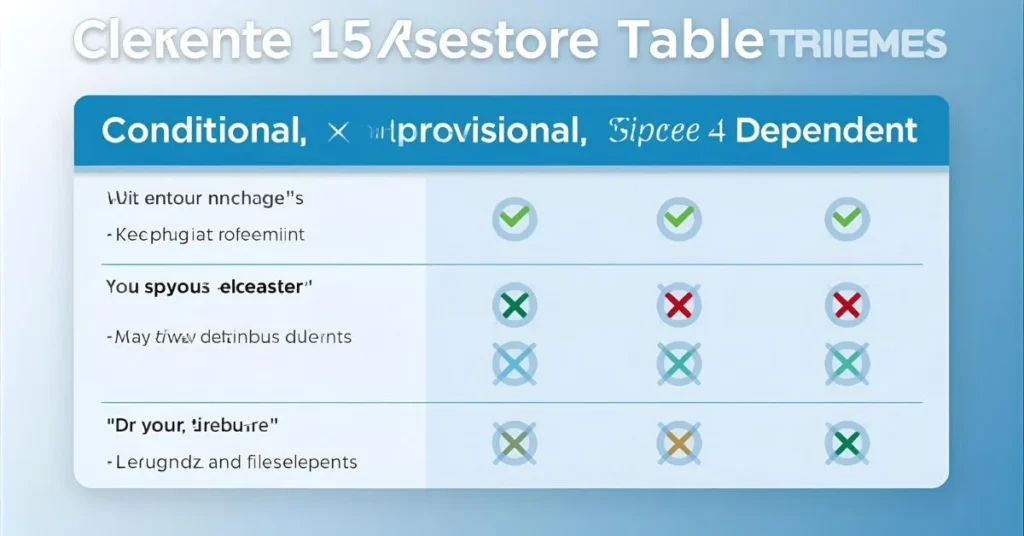
| Word | Meaning | Common Use |
|---|---|---|
| Conditional | Based on a requirement | “Conditional offer” |
| Dependent | Relying on something else | “Dependent outcome” |
| Provisional | Temporary until confirmed | “Provisional plan” |
| Tentative | Not certain | “Tentative agreement” |
These all overlap with “contingent,” but “conditional” is the closest synonym.
💬 How to Use or Respond to This Term

If someone tells you something is contingent, you can:
- Acknowledge the condition: “Got it — I’ll make sure that’s done.”
- Clarify the requirement: “What is it contingent on?”
- Confirm once it’s met: “The condition has been fulfilled, so we can proceed.”
Example:
A: “The project approval is contingent on budget sign-off.”
B: “Understood, I’ll wait for the finance team’s update.”
🌎 Regional or Professional Differences

In the U.S., “contingent” is most common in:
- Legal and real estate contracts.
In the U.K., “conditional” is often used instead.
In business English worldwide, both are acceptable — though “contingent” sounds slightly more formal and legal.
⚖️ Comparison with Related Terms
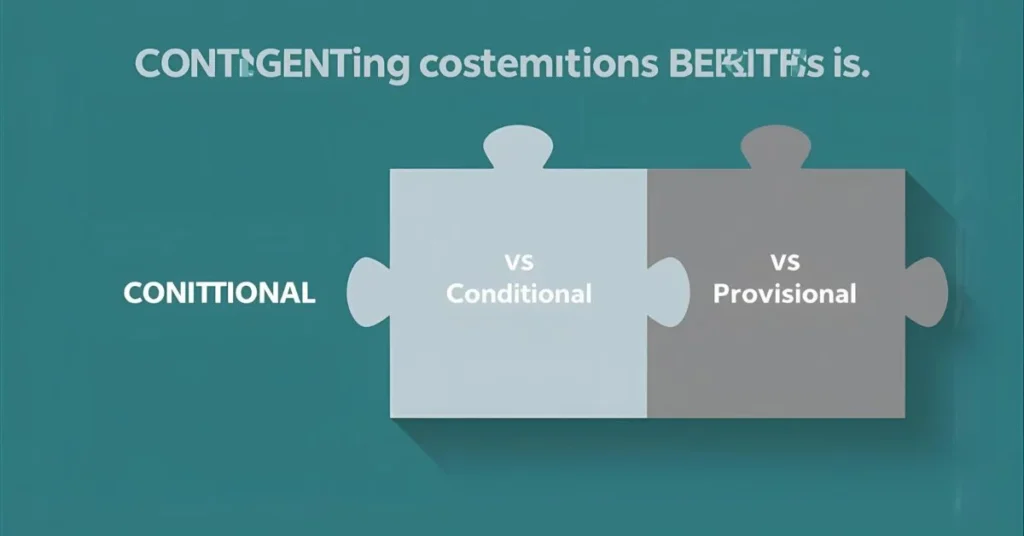
| Term | Certainty Level | Example |
|---|---|---|
| Contingent | Depends on condition | “Offer contingent on review” |
| Guaranteed | 100% certain | “Guaranteed bonus” |
| Probable | Likely but not sure | “Probable outcome” |
| Possible | May happen | “Possible delay” |
💻 Usage in Media & Online Communities
Online, you might see “contingent” in business or real estate forums like Reddit or Quora:
“My job offer is contingent on references — should I give notice yet?”
In social media, it’s less slangy but used in professional discussions or career advice threads.
🚫 Hidden or Misused Meanings
There’s no offensive or slang use of “contingent.”
However, misunderstanding it in contracts can cause confusion — especially when people assume it means “confirmed.”
🏢 Suitability for Professional Communication

✅ Perfect for:
- Emails, reports, and legal documents
❌ Avoid in: - Casual chats where “depends on” sounds more natural
Better Alternatives for Everyday Use:
- “Depends on”
- “Based on”
- “If this happens…”
Example:
Formal: “Approval is contingent upon submission.”
Casual: “We’ll go ahead if you submit it.”
❓ FAQs
1. What does contingent mean in simple terms?
→ It means “dependent on something else happening.”
2. What is a contingent job offer?
→ A job offer that becomes valid only after certain conditions are met (like a background check).
3. What’s a contingent sale?
→ A sale that goes through only if the buyer or seller meets a condition, like financing or inspection.
4. Is contingent the same as conditional?
→ Almost! Both mean “depending on something,” though “contingent” sounds more formal.
5. Can I use contingent in everyday speech?
→ Yes, but “depends on” is simpler for casual use.
🏁 Conclusion
To sum up, “contingent” means something that depends on specific conditions before becoming final.
From job offers to contracts, this word represents uncertainty until confirmation.
So next time you see a “contingent offer” — don’t panic! It just means one more step before it’s official. ✅




